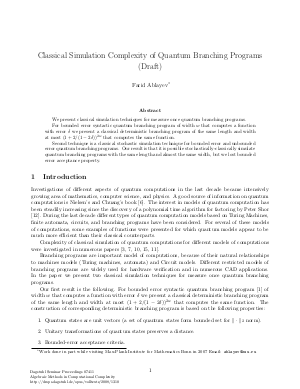Classical Simulation Complexity of Quantum Branching Programs
Author Farid Ablayev
-
Part of:
Volume:
Dagstuhl Seminar Proceedings, Volume 7411
Part of: Series: Dagstuhl Seminar Proceedings (DagSemProc) - License:
 Creative Commons Attribution 4.0 International license
Creative Commons Attribution 4.0 International license
- Publication Date: 2008-01-23
Files

PDF
DagSemProc.07411.3.pdf
- Filesize: 212 kB
- 10 pages
PDF
DagSemProc.07411.3-add.pdf
- Filesize: 171 kB
Document Identifiers
Subject Classification
Keywords
- Quantum algorithms
- Branching Programs
- Complexity
Metrics
- Access Statistics
-
Total Accesses (updated on a weekly basis)
0PDF Downloads0Metadata Views
Abstract
We present classical simulation techniques for measure once quantum
branching programs.
For bounded error syntactic quantum branching program of width $w$
that computes a function with error $delta$ we present a classical
deterministic branching program of the same length and width at most
$(1+2/(1-2delta))^{2w}$ that computes the same function.
Second technique is a classical stochastic simulation technique for
bounded error and unbounded error quantum branching programs. Our
result is that it is possible stochastically-classically simulate
quantum branching programs with the same length and almost the same
width, but we lost bounded error acceptance property.
Cite As Get BibTex
Farid Ablayev. Classical Simulation Complexity of Quantum Branching Programs. In Algebraic Methods in Computational Complexity. Dagstuhl Seminar Proceedings, Volume 7411, pp. 1-10, Schloss Dagstuhl – Leibniz-Zentrum für Informatik (2008)
https://doi.org/10.4230/DagSemProc.07411.3
BibTex
@InProceedings{ablayev:DagSemProc.07411.3,
author = {Ablayev, Farid},
title = {{Classical Simulation Complexity of Quantum Branching Programs}},
booktitle = {Algebraic Methods in Computational Complexity},
pages = {1--10},
series = {Dagstuhl Seminar Proceedings (DagSemProc)},
ISSN = {1862-4405},
year = {2008},
volume = {7411},
editor = {Manindra Agrawal and Harry Buhrman and Lance Fortnow and Thomas Thierauf},
publisher = {Schloss Dagstuhl -- Leibniz-Zentrum f{\"u}r Informatik},
address = {Dagstuhl, Germany},
URL = {https://drops.dagstuhl.de/entities/document/10.4230/DagSemProc.07411.3},
URN = {urn:nbn:de:0030-drops-13107},
doi = {10.4230/DagSemProc.07411.3},
annote = {Keywords: Quantum algorithms, Branching Programs, Complexity}
}
